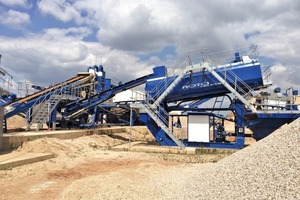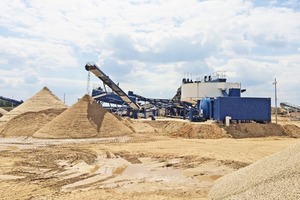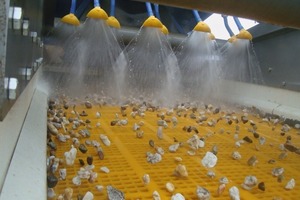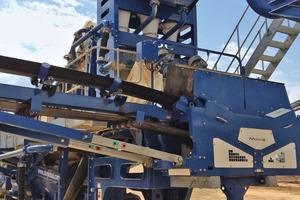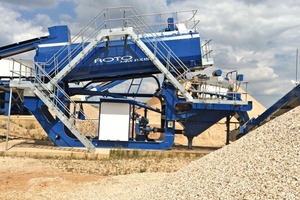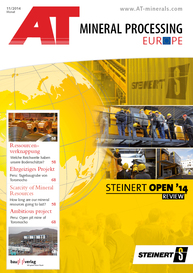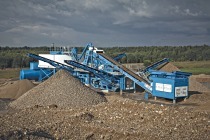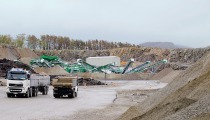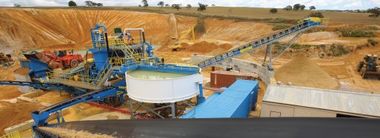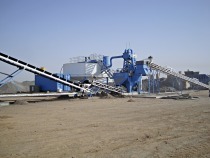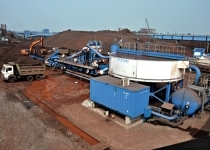Integrated environmental protection
CDE Global and Josef Bohnen GmbH hosted an open day event on 23rd August at a new sand and gravel washing plant at Josef Bohnen’s main quarry in Swisttal, near Cologne. The turnkey plant (Fig. 1) was purchased with funding from the BMU-Environmental Innovation Programme. Josef Bohnen GmbH is a sand and gravel producer located near Cologne in West Germany. The company also specialises in civil engineering, earthmoving and demolition services and has been operational in the region for over 60 years. Josef Bohnen GmbH supplies the regions of Bonn and Cologne with a fleet of equipment including 15 lorries, 3 wheel loaders and a crushing and screening plant.
In order for Josef Bohnen to meet the rising demand for washed sand and aggregates in recent years it was recognised in 2012 that an innovative washing solution was needed. “Water is not readily available as the quarry at Swisttal and a minimal space requirement was also necessary as there was no option for settling ponds” explains Matthias Haus, Director at Josef Bohnen GmbH. The company identified that the required wet processing technology was not available in Germany and approached Northern Irish company, CDE Global to find a solution. CDE was tasked with designing a washing plant with a particular focus on conservation of natural resources and energy efficiency. This new and innovative concept in Germany qualified for funding from the BMU-Environmental Innovation Programme. The submission for the plant funding was centred around the aims of reducing water consumption, reducing CO2 emissions and washing with a small footprint.
Innovation Funding
The Federal Environment Ministry provides funds from the BMU-Environmental Innovation Programme to promote demonstration projects within Germany that have large-scale reduction/avoidance potential and which can be transferred to similar systems operated by other users. The assistance is increasingly focusing on integrated environmental protection measures. Key focus is on climate mitigation measures, including renewable energy and energy efficiency projects. However, measures in the fields of water/waste water, waste, air quality control and noise abatement are also eligible for funding.
The washing plant for Josef Bohnen GmbH clearly matched the objectives of the Innovation Programme and funding was awarded. CDE Global commissioned the sand and gravel washing plant in April 2014 (Fig. 2). It consists of an AggMax 152 integrated scrubbing system, a M2500 washing plant and an AquaCycle A400 thickener and produces 5 washed sand and aggregate products ready for sale.
An Innovative Process
The washing plant is producing 140 t/h of washed and sized sand and aggregates. The typical breakdown of this is 65 t/h of 0-2 mm sand, 20 t/h of 2-8 mm sand, 12 t/h of 0-63 micron sludge with the remainder of the tonnage being fed to the Agg-Max for aggregate processing. The company has control over the size and tonnage of each product produced with features like the changeable mats on the EvoWash dewatering screen which can be easily adjusted to vary the size and quantity of sand coming off the screen. Every aspect of the plant has been designed with conservation and efficiency in mind. The feed hopper is located quite a distance away from the plant, but close to the raw feed. The means the material doesn’t have to be shovelled long distances from the source, which has significantly reduced operational and fuel costs. Other innovations on the CDE plant include:
Integrated Twin-Deck ProGrade Screen
Unlike dry sizing screens that have spray bars added, the ProGrade screening range has been designed with its primary function to be as a rinsing screen. The ProGrade model in this plant is a P2-75 with each deck having a 5 m x 1.5 m surface area (Fig. 3). The ProGrade P2-75 has FEA (Finite Element Analysis) verification, and is an integral part of the CDE range, featured on the R2500, M4500 and in this case the M2500. All FEA results are verified with onsite physical testing procedures. Physical tests have also been carried out within the dedicated ProGrade screen testing facility at CDE Headquarters in Cookstown.
The P2-75 is integrated on the M2500 E4X and receives the 0-32 mm feed directly from the feed conveyor on the M2500. The top deck removes the washed +32 mm oversize material which is stockpiled using the first integrated 9 m wing conveyor on the M2500. 8-32 mm material passes through to the lower deck and is transferred to the AggMax scrubbing system. Meanwhile the -8mm particles are transferred to the EvoWash sand washing plant for further processing.
Integrated EvoWash sand washing plant
The EvoWash is integrated on the M2500 and eliminates loss of quality fines to the AquaCycle water treatment phase. This ensures effective material recovery and minimal waste and ultimately ensures that Josef Bohnen GmbH extracts maximum value from the feed material (Fig. 4). “The sand washing phase means we are capturing even the finest material fraction and this quality sand is not being lost. We have control over the grade of sand we produce and can ensure the sand coming off the dewatering screen meets the specification we require”, comments Matthias Haus.
AggMax Integrated Scrubbing System
The AggMax uses innovative high frequency screening technology and powerful logwasher technology to screen and scrub heavily claybound material. The AggMax 152 on this project has a capacity of 150 t/h, produces 2 sized aggregate products (8-16 mm and 16-32 mm) and consists of a RotoMax logwasher and 2-deck sizing screen (Fig. 5). The integration of all elements of the AggMax on a single compact and portable chassis is unique in the industry and has ensured minimum installation time and a reduced plant footprint for Josef Bohnen GmbH.
AquaCycle Water Treatment System
The introduction of the AquaCycle system brought significant cost savings to this project as it reduces the volume of fresh water required to feed a washing plant by up to 90 %, making this a truly innovative product. Features of the AquaCycle include a de-aeration chamber where polyelectrolyte is dosed to the waste water, a unique scraper mechanism for the conditioning of sludge and a full diameter static bridge for safe material testing and maintenance.
The AquaCycle at Swisttal is an A400 model which has a capacity of 400 m3/h. Excess fines are passed to the AquaCycle A400 from the dual cyclones on the EvoWash sand washing plant, integrated on the M2500. Sludge settles at the bottom of the tank where the unique rake arrangement ensures that the sludge is maintained at an even consistency before it is discharged to ponds. Clean water overflows the thickener and recycles to the AquaStore W374 water tank. The AquaStore is a complete water storage and pumping system for the recycling of recovered water around the washing plant.

